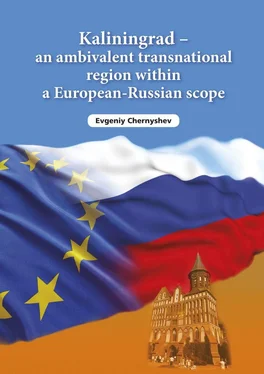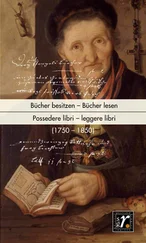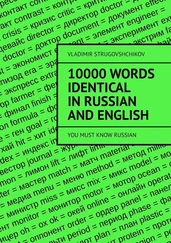Since many Kaliningradians «migrate» on weekends to « Trójmiasto » 32 32 «Trójmiasto» is urban agglomeration consisting of three Polish cities of Gdansk, Gdynia and Sopot.
my field of research literally «overflows» across the border and rushed for 120 kilometers into the EU, «carpets» the cobbled streets of the old town of Gdansk, corridors of shopping malls, seafront of Sopot, theatrical annual processions of the St. Dominic Fair, yacht festivals and new shopping centers, arrayed along the Polish-Russian border.
On the other hand, my experience of research and teaching at the Baltic Federal University of Immanuel Kant helped me to establish contacts with students of universities of Kaliningrad, with whom I have organized pre-scheduled interviews.
My affiliation with the institution «from the West», which is the Humboldt-University, initially caused the «mixture sense of wonder» among the respondents of my research. The interest of Russian researchers, mostly political scientists and sociologists, considered as usual. Interest on the part of the West is expected only in respect to the lighting in the news and usually in a negative context. The fact that I am conducting an academic study has caused slight bewilderment: «It cannot be! We are interesting for researchers from the West?»
Secondly, my respondents were surprised after I said that I am conducting research in «European Ethnology». They asked with curiosity: «They are interested what we eat, drink, how looks like our housing is and what we daily wear?»
At this point, I should refer to Buckowski 33 33 Buchowski, Michał: Hierarchien des Wissens in der ostmitteleuropäischen Anthropologie, in: Poehls, Kerstin; Vonderau, Asta (Hrsg.): Turn to Europe. Kulturanthropologische Europaforschungen, Berliner Blätter: Ethnographische und ethnologische Beiträge, Heft 41, Münster 2006.
, who is of the opinion that still exist knowledge hierarchies, when researchers from the west and their study met with more respect among the field. As explanation for this attitude Buchowski considers a kind of inferiority complex among anthropologists from Central and Eastern European countries, who research the post-socialism. In my case, it was quite the contrary, because people, who are unfamiliar with me, took me as a researcher from the «Western Europe».
Buckowski explains this approach as reaction on colonial pattern of thinking. According to Buchowski, western anthropologists often reject locally produced theories, because they would classify it as ideologically contaminated. The western anthropologists pursue the goals to preserve their interpretations and discourse sovereignty and to legitimize their scientific position 34 34 Buchowski, Michał: Hierarchien des Wissens in der ostmitteleuropäischen Anthropologie, in: Poehls, Kerstin; Vonderau, Asta (Hrsg.): Turn to Europe. Kulturanthropologische Europaforschungen, Berliner Blätter: Ethnographische und ethnologische Beiträge, Heft 41, Münster/Hamburg/Berlin/London 2006. S. 37—38.
.
In conversations some respondents expressed ambivalent feelings of suspicion and of respect to me at the same time.
During interviews with respondents from both groups I felt their aspiration to «explain» features, problems and possible prospects of Kaliningrad, as part of a cross-border space and as a «European» city. I felt their aspiration to use me as a reporter on the line to the west. This confidence appeared after a few respondents said about it directly. One opinion united almost all respondents: «It is „nice“ and „right“ that they are interested in us».
How was the search and identification of fields for interviews and participant observation? Field was found at scientific conferences, at educational institutions, informal youth hangouts, in the corridors of the official regional authorities, media expert communities of journalists and political scientists, in the queue on sale of European goods, on the state border (on the way to it, during customs and pass control and during my stay abroad in bordered zone).
As Baumbach emphasizes the main agents involved in creating and sustaining «regions of culture» and «regions of identity» are acting by communicating shared traditions, customs, and values include a wide range of different sites and media devoted to the promotion of regional history and the creation of a regional collective consciousness. This is exemplified through museums and monuments, traditional fairs and festivals of art 35 35 Baumbach, Sibylle: Conceptualising «Region», «Identity» and «Culture», and mapping approaches to regions of culture and regions of identity. In: Baumbach, Sibylle (ed.): Regions of culture – regions of identity. Trier 2010, p. 1.
. Therefore events and actions, which aimed at maintaining or reconstruction of historical traditions and values, have been my priority in time of field research. Among them are public holiday of «Long sausage» 36 36 First «Day of long sausage» noted by 1520, when the butchers of Königsberg produced a long sausage and carried it to the downtown. The idea to revive this holiday was proposed by the management of the World Ocean Museum in Kaliningrad. Nowadays a sausage has a total length of about 200 meters.
, historical reconstruction 37 37 Historic reconstruction of battles of knights of the Teutonic Order, as well as the battle of Gumbinnen in 1914, the battle of Friedland in 1807 and the Battle of Preussisch Eylau in 1807 became regular and widely popular among Kaliningradians and tourists.
, «Week of Prussia cat» 38 38 The prototype for the «Prussian cat» is the hero of the novel by E. T. A. Hoffmann «Lebensansichten des Katers Murr».
. By these and other events I held participating observations.
As Welz considers «participating observation is used by the European ethnology often only to provide additional background and contextual knowledge» 39 39 Welz, Gisela: Ethnografien europäischer Modernen, in: Binder, Beate; Göttsch, Silke; Kaschuba, Wolfgang; Vanja, Konrad (Hrsg.): Ort. Arbeit. Körper. Ethnografie Europäischer Modernen. Münster 2005. S. 25.
. Through those events and holidays I was looking for this background and knowledge, and my search led me to respondents and interviews, which I did not plan and did not expect at all.
I undertook periodic visits to the «field», and constantly visited and left again. I considered this approach as appropriate, taking into account the peculiarity of the study and issues, which stood in front of me. During my empirical research new developments took place: «field» was updated and expanded. Actually it was formed «additional field» – Small border traffic, which is not only spatially enriched the participating observation (allowing more intensively include the border areas of Poland), but also qualitative diversified the research in the «original field» directly in Kaliningrad, made it more complex and multifaceted, especially in the context of cross-border mobility.
If in Kaliningrad I was presented as a «guest» of the field, then in Berlin, the «guests» were Kaliningradians: there was the opposite context. I had the opportunity to experience it during the final phase of empirical research of startup entrepreneurs from Kaliningrad in Berlin. I chose this example of cross-border mobility for the following reasons: it is a novel focus of the study, which has not previously covered; IT – initiatives are a key part of the discourse on Russia’s modernization as a vector of post-socialist development; Kaliningrad (besides Moscow) declared as a «pilot region» of the modernization.
Participating observation provides the context and collection of background information, as well as provided me with initial ideas on self-identification strategies of young Kaliningradians in the context of the regional culture of the transnational space.
Читать дальше











